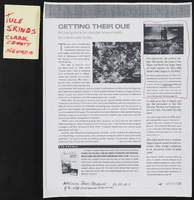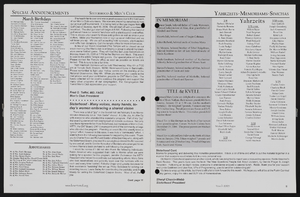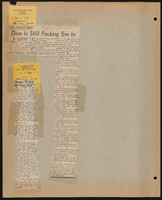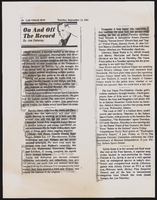Search the Special Collections and Archives Portal
Search Results

Transcript of interview with George Levine by Barbara Tabach, April 16, 2015
Date
Archival Collection
Description
In this interview, George reflects upon his life in Las Vegas, particularly the period as ma?tre d? of the Sand?s Copa Room. Joined by his daughter - and former United States Democratic Congresswomen-Shelley Berkley, George shares stories of working in the gaming industry during this unique era, including those of Frank Sinatra and Wayne Newton. He also talks about his life as a professional gambler.
Born on February 28, 1925 in Sommerville, New Jersey, George Levine?s family moved to his childhood home, Manhattan?s Lower East Side, when he was six months old. George served on a United States Navy aircraft carrier for thirty months during World War II. After returning home, he met his first wife Estelle, with whom he had two daughters, and soon moved to Kiamesha Lake, New York to work at the Concord Resort Hotel. In 1963, George and his family moved to Las Vegas and took his first job at Mr. Sy?s Casino. Six months later he began waiting tables at the Sands Hotel and Casino. He worked his way up the ranks and was ma?tre d' from 1979 until the hotel closed in 1996.
Text

Transcript of interview with Maurice "Maury" Halfon Behar by Barbara Tabach, March 14, 2016
Date
Archival Collection
Description
In this interview, Behar reflects upon his childhood in France, and later adjusting to life in New York. He talks of his admiration for those that have cared for him in his youth, including Marie Cazous and his parents, Marco and Flora Behar. He details his career path, and how he ended up in Las Vegas. In addition, Behar describes a recent family trip to France, visiting his place of birth for the first time since leaving as a child.
Text
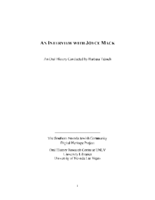
Transcript of interview with Joyce Mack by Barbara Tabach, February 23, 2015
Date
Archival Collection
Description
In this interview, Joyce Mack discusses meeting her husband, Jerry Mack, in Los Angeles,their early life as a couple, and moving to Las Vegas at the suggestion of Jerry's father, Nate Mack. She discusses how Jerry met Parry Thomas and their banking and real estate investments. Mrs. Mack talks about the opening of the Thomas and Mack Center at UNLV, and the development of the strip hotels, and discusses her children.
Joyce Mack: wife to Jerry Mack and matriarch of one of the most influential families of Las Vegas history. During this oral history conversation, she begins by tracing her family ancestry from Kiev to New York to Omaha and then Los Angeles, where she was born and raised. At a UCLA fraternity party in the early 1940s, a teenage Joyce Rosenberg was swept off her feet by her older brother's friend Jerry Mack. Jerry was from Boulder City, Nevada and had attended school in Las Vegas. In 1946, the couple married and took an extended honeymoon throughout the United States and Cuba. Soon afterwards, Jerry's father Nate Mack, a businessman and real estate developer encouraged the newlyweds to come to Las Vegas. She tells of Jerry sharing his vision of the valley's future. Thus began a successful journey that traverses decades of Las Vegas history and breathtaking growth in which the Macks were active participants and leaders. Joyce recalls the people the first met, who they raised their children side-by-side with and became lasting friends. These people were other Las Vegas pioneers including the Greenspuns and mostly importantly her husband's partnership with Parry Thomas which created the Bank of Las Vegas. It was their partnership she explains that reduced the presence of the mob element. As members of the small Jewish community of the late 1940s, the Macks would participate in the founding of Temple Beth Sholom.
Text
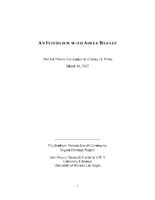
Transcript of interview with Adele Baratz by Claytee D. White, March 19, 2007
Date
Archival Collection
Description
Interview with Adele Baratz by Claytee White on March 19, 2007. In this interview, Baratz talks about her parents who came to the United States as teenagers from Russia and eventually settled in Las Vegas after a short time in California. She discusses the Jewish community in Las Vegas when she was growing up, and her father's job selling bootlegging supplies, then as a real estate broker, then as a bar owner. Baratz attended the Fifth Street Grammar School, which was built after a fire destroyed the original school, and Las Vegas High School. As a teenager, she worked at Nellis as a messenger and in the rations department, then went to nursing school in Baltimore at Sinai Hospital. She talks about her father's bar, "Al's Bar," that was popular with Union Pacific Railroad workers, and how the bar was forced out for the building of the Golden Nugget. Baratz recounts where her family lived, the growth of the Jewish community, and building the first synagogue on Carson Street.
Text

Transcript of interview with Jacqueline Baskow by Barbara Tabach, October 24, 2016
Date
Archival Collection
Description
In 1976, Jacqueline "Jaki" Baskow was an aspiring actress when she and a friend accepted an invitation to worked in a movie studio in Las Vegas. She had three-hundred dollars to her name, a dream and lots of dynamic energy. Though the movie studio offer did not quite materialized as she hoped - the invitation had come from Batman co-creator Bob Kane - Jaki's trajectory into Las Vegas, working with talents and planning events became an over forty year career. In this interview, she talks about growing up Jewish in Camden, New Jersey where her father was a murder victim; her tenacious effort to find the perpetrator included the help of celebrity detective Joe Schillaci. She shares stories of the colorful array of A-list entertainers she has worked with to build her successful business, Baskow and Associates. She has built a niche of handling large corporate events, hiring talent and attention to details for exciting events. She reflects on the people and moments that impelled her on; mentors such as Bobby Morris and Frank Sinatra and Jilly Rizzo.
Text

